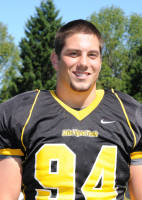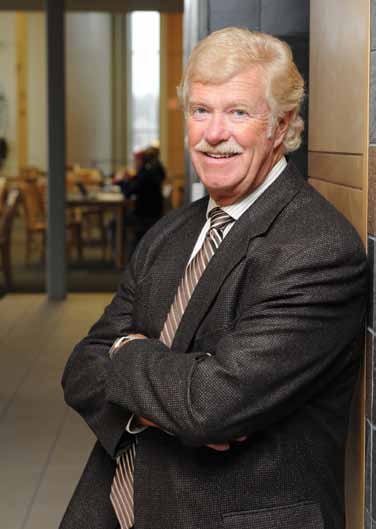
Ever wonder what it would be like to be a collegiate student-athlete? Can you imagine trying to fit 3 hours of practice into your already busy days? At Michigan Tech, we have several student-athletes that choose a major in the School of Business and Economics. One student, Tanner Agen, is a freshmen defensive lineman for the Husky’s football team. Agen, out of Kaukauna, Wisconsin, was named defensive scout team player of the year and also has a work study with the School of Business and Economics staff and administration in the Academic Office Building. After working with Tanner and knowing about the time management skills required for success in collegiate student athletes, we wanted to learn more about Tanner’s transition from high school to his first semester of college.
Here’s my interview with Tanner to learn more about his first semester as a Husky:
Why did you choose Michigan Tech?
I chose Michigan Tech because of the opportunities I have as an athlete and in a future profession. I have a dream in mind that I want to play as long as I can, and I feel that the coaching staff here will give me great opportunities. Although going pro is a slim chance, I need a backup plan with a profession that I can live off of. Michigan Tech is an excellent school and it can open many doors for me along the road.
What was your first impression of Michigan Tech?
My first impression of Michigan Tech was very good. When touring the athletic facilities, I found the place to be very clean and the coaching staff well organized. They all had that winning attitude and I knew they believed that I was and could be a very good player for them. Along with athletics, I liked how all the educational buildings were close together and the campus was quite small.
What is your major? Why?
My major coming into my first semester was Accounting. I am very good with numbers and I believed it was best suited for me. Now I realize that accounting isn’t really for me, so I am thinking of going into economics or finance. I find economics very interesting and there is demand for business majors. There is a high chance of getting a job out of college, which is something everyone wants, I hope.
How many credits did you take in your first semester? Was it too much/ too little?
I took the minimum of twelve credits because it was in the football season and also having to work. I feel it was just right and for me because of what I had for a schedule. Maybe if I didn’t have work I would have taken another class, but redshirting my first year gives me another year to play and go to school so I can lighten my load and not take so many.
What importance does your coaching staff place on academic success?
The requirements to stay out of study tables are to have a 2.3 or higher GPA. They also say that school does come first because we are “Student-Athletes”. So if we have a class or a test during practice or directly after, they are understanding and get us to where we have to be.
What is the biggest difference between high school courses and college courses?
High school courses are the same classes every day taking it in slowly. The teachers make sure you get your studies done and are there to help you a lot. In college, you don’t have the same classes every day and the learning pace is a whole lot faster. We may go through a section in a 50 min class period and move on to the next one the next class. Some classes vary in time as well in college and in high school, all the classes were the same time frame.
What is the biggest difference between high school and college football?
College football is completely different than high school. The speed of the game, how practices are run, the coaching, and your life is pretty much football. I love the game and want to succeed, but my life is football and school work in college. Also, what kind of shape you have to be in. I thought I was in good shape coming into the season, but I thought wrong. Personally, I believe that the first year of college is an eye opener and a learning experience.
Do you think your professors understand of your athletic commitments?
I think they understand what athletes have to do and I know they don’t treat us in a special way either. They treat their students the same and I feel that they know that we don’t want to slack of and try to get by with a pass/fail grade.
How much time per week is required for practice? In season and out.
In season practice starts at 3:00PM and goes until about 6:00PM. Also in the beginning of the season, there are morning meetings and walk throughs and night meetings as well. So there is a lot of time spent up at the SDC. Out of season is a little different. All that is really required is that we lift and some occasional meetings here and there.
What is the best thing about being a Husky?
The best thing about being a Husky is all the help that is offered here. You aren’t alone in any way. Coaches for football help me out, the athletic trainer is always there, teachers have office hours and are always willing to talk and help, and the administrators really guide you through college and it makes it easier on a student.


